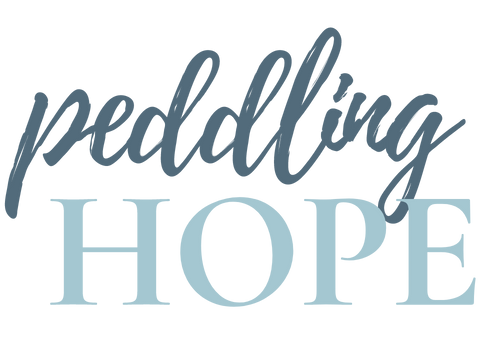Resilience Builds HOPE…and HOPE Builds Resilience
In a world that often feels chaotic, it can be tough to hold on to hope. History shows us that hardship—whether war, economic difficulties, political unrest, or struggles for social justice—has always been a part of life. Each generation faces its own challenges.
With that said, hope can sometimes feel naïve. Maybe the problem isn't hope itself, but rather how we define it. Many people see hope as everything turning out fine. I challenge that idea.
Hope is not simply about things working out.
Hope is a mindset, a philosophy of life, growth, strength, and character. Just like how we physically grow stronger by stretching and tearing muscles, emotional recovery strengthens our hope.
Instead of hoping that life will be perfect, true hope comes from knowing we will be okay, no matter what.
When we develop resilience, we can face turbulent times with confidence. We aren’t just hoping for things to get better; we are building the skills to thrive.
How Do We Build Resilience?
How do we create that symbiotic relationship between resilience and hope? How do we develop the skills necessary to weather life’s inevitable storms?
Conditioning Is Key
Perhaps you are old enough to know what I mean by “wax on, wax off.”
For those who have not seen the movie The Karate Kid, there is a scene in the movie where teenager Daniel goes to elder Mr. Miyagi for help in preparing for a karate match against a bully.
Daniel went in, hopeful that Mr. Miyagi would show him some key moves to gain superiority over his opponent during the match. Instead, after agreeing to help him, Mr. Miyagi had Daniel wax the car and paint the fence.
Frustrated, Daniel leaves only to return to tell Mr. Miyagi what he thought of being treated like a servant, Miyagi begins throwing punches which Daniel skillfully blocks. The work Miyagi had him doing conditioned him. Daniel gained muscle memory through the hours of work he had done.
It wasn’t until he was put to the test that he recognized the connection.
Similarly, building resilience happens during those in-between moments in life. Just like athletes train between games, we must practice emotional and mental conditioning between life’s challenges. We develop resilience during quiet times, so when chaos strikes, we are ready.
The 7 Cs of Resilience
The concept of the 7 Cs of Resilience comes from Dr. Ken Ginsburg, a pediatrician who specializes in Adolescent Medicine. He works with youth facing incredible challenges, and his model highlights seven key areas that help people build resilience and manage adversity.
These concepts have been embraced by leaders who recognize the importance of building resilience before challenges arise. It's not just about survival—it’s about thriving. Resilience gives us a sense of control over our lives. We remind our nervous system that we’re capable, that we’ve got this.
Here’s a breakdown of the 7 Cs and how you can build resilience and hope in your own life.
1. Competence
Competence refers to the skills you’ve developed by overcoming challenges. The skills you develop through overcoming difficult situations become part of your toolkit.
Think about the abilities you’ve built over the years—problem-solving, communication, leadership—and how they’ve prepared you for adversity.
If you feel like you’re lacking in certain areas, now is the time to push yourself and develop new skills. You’ll constantly evolve and improve as you face new experiences.
2. Confidence
At the end of every Oprah magazine, Oprah had a section called “Things I Know For Sure.” I love that concept. Confidence comes from self-awareness.
Reflect on the challenges you’ve already faced. What skills have you gained? Maybe you learned to manage a tight budget during hard times or developed conflict-resolution skills.
Confidence grows when you focus on what you know for sure you can handle. Everyone has unique talents and experiences to contribute in difficult times. What are yours?
3. Connection
We all need a support system. It could be family, friends, a church community, or even a sports team.
During tough times, connection is key. Think about how people come together during natural disasters or pandemics. We help each other get groceries, share supplies, and provide emotional support.
Building and maintaining a strong network of connections is essential for resilience.
4. Character
Your values are your foundation. When life gets tough, your values keep you grounded.
One of the exercises I include in my book Thriving in Chaos is to ground yourself in the values you hold.
What matters most to you? Is it honesty, loyalty, or personal growth? Whatever your core values are, let them guide your decisions and actions.
When you align your life with your values, you build resilience by staying true to yourself, even in the face of adversity.
5. Contribution
One of my favourite movies is Dead Poets Society. Robin Williams’ character quotes a line from a Walt Whitman poem: “That the powerful play goes on, and you may contribute a verse.”
This question challenges us to think about our contribution to the world. What do you have to offer? Whether it’s helping your family, community, or society, your contribution is valuable.
By focusing on what you can give, you build resilience through a sense of purpose.
6. Coping
We all have coping strategies, whether they’re helpful or harmful. Harmful coping mechanisms often develop in response to trauma, and they may have served a purpose at one time. But as Maya Angelou said, “When you know better, you do better.”
The key is to develop healthy coping strategies that strengthen your resilience. Practices like getting enough sleep, eating nourishing food, and practicing mindfulness can help expand your capacity to handle stress.
Consider what daily habits you can adopt to build your mental and emotional strength.
7. Control
While we can’t always control what happens in life, we can control how we respond.
When life feels overwhelming, focus on the things you can control. Maybe you can’t change your thoughts or feelings right away, but you can control your behaviours.
Physical activity, journaling, or talking with a friend can help you process your emotions in a healthy way. Taking action in small areas helps you feel more in control overall.
What Resonates With You?
Which of the 7 Cs do you already feel strong in? Take some time to reflect on how these skills show up in your life. When you have a framework like this, hope grows because you know you're actively building your resilience muscles. You’ll be OK. You can trust yourself and your community to help you weather the storm.
You may not have control over everything happening in the world, but you can condition yourself to handle whatever comes your way. So, wax on and wax off—you’ve got this!


